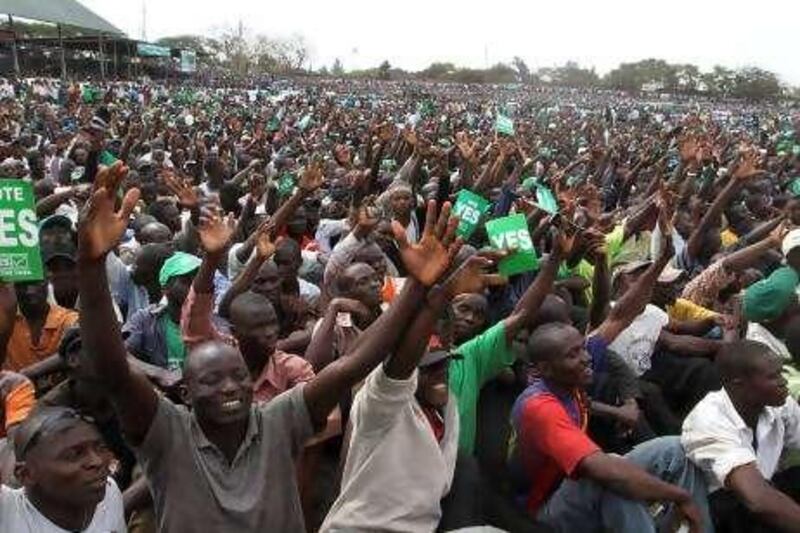NAIROBI // Kenyans will decide on Wednesday whether to adopt significant changes to their constitution, but the vote may produce violence rather than reform. Analysts say the proposed reforms would curb corrupt politicians' power and end the cycles of post-election bloodshed. But politicians have aligned themselves along ethnic and religious lines to support or reject the changes and the referendum could ironically spark another round of violence.
The campaign has already turned deadly. Two bomb blasts in June at a rally for opponents of the constitution killed five people and injured another 75. The revised constitution is part of a raft of reforms Kenya has undertaken since a 2008 presidential election dispute turned bloody. Mwai Kibaki, the president, claimed victory but observers said the vote was flawed. His challenger, Raila Odinga, refused to accept the result and violence ensued.
Members of rival tribes killed each other with blunt machetes and bows and arrows in some of the country's worst violence since the 1950s. In all, 1,300 people died and some 300,000 were displaced by the fighting. Mr Kibaki and Mr Odinga, who is now the prime minister, agreed to share power in a coalition government. The former rivals both back the proposed constitution and have crisscrossed the country campaigning for the "yes" vote.
If it passes, the constitution would reform the judiciary and change the way Kenyans vote for their leaders. It also would limit the president's powers and create a second house in parliament. Mr Kibaki has staked his legacy to passing the constitution and bringing about reforms. Lately, he has been locked in a very public dispute with the former president Daniel Arab Moi, who opposes the bill. A bloc of opposition politicians, many from the Kalenjin tribe of Mr Moi, is against the draft because it would place limits on land ownership. Historical injustices over land in this country of 40 million people became a key issue during the post-election violence.
Church leaders have also thrown their weight behind the "no" campaign. The Christian church is against a clause that would allow women to have abortions in cases of medical emergencies. The church is also against the inclusion of Islamic courts in predominantly Muslim areas. The United States and the European Union are supporting the reform process, though western diplomats have been careful not to appear meddling in Kenya's politics.
The US president, Barack Obama, whose father was from Kenya, said in a July 12 statement: "This is a singular opportunity to put Kenyan governance on a more solid footing that can move beyond ethnic violence, can move beyond corruption, can move the country towards a path of economic prosperity. And so I hope that everybody participates, everybody takes advantage of this moment, and those who would try to undermine this process I think are making a big mistake."
The latest polls by Synovate, a regional pollster, show that 60 per cent of voters support the constitution. "This is a chance for us to change Kenya," said Pauline Ndugu, 34, an ice cream shop manager. "Of course I will be supporting" the constitution. Observers will be watching to see if the voting turns violent. Supporters and opponents staged competing rallies yesterday and both were peaceful.
But both sides have clashed at rallies in recent weeks and analysts say more fighting could break out after the results are announced. If adopted, this would be the first time Kenya has changed its constitution since independence in 1963. The country held a referendum on a new constitution in 2005, but it was voted down by 60 per cent. Nine people died in violent protests during that campaign. Security is being stepped up ahead of Wednesday's poll, the government said. Some Kenyans are taking their own precautions. Traders in the Rift Valley towns of Nakuru and Naivasha, which experienced some of the worst post-election violence, have bought special riot insurance policies to protect their businesses, according to insurers UAP and APA.
Tourism, a billion-dollar industry and Kenya's largest income generator, is slightly off as visitors wait and see what happens after the referendum, tourism officials said. Tourist visits sharply dropped for a year after the 2008 violence, crippling the economy. "I think tourists just want to be cautious ahead of the vote," said John Mwangi, a tourism official. "Once they see that everything is calm, it will be back to business as usual."
The US Embassy in Kenya issued a travel alert acknowledging that "past elections in Kenya have become violent", and demonstrations related to the referendum "are unpredictable, can become violent and should be avoided if at all possible". @Email:mbrown@thenational.ae





